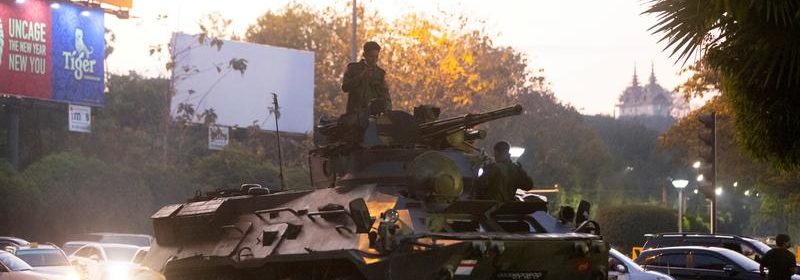Myanmar junta chief urges economic action as Western pressure grows

(Reuters) – The leader of Myanmar’s junta has called for energetic efforts to revive an ailing economy, state media reported on Tuesday, as Western countries considered more sanctions to press the generals to shun a violent crackdown on democracy protests.
The call for focus on the economy came after a general strike shut businesses on Monday and huge crowds gathered to denounce the military’s Feb. 1 coup and demand the release of elected leader Aung San Suu Kyi, despite a warning from authorities that confrontation could get people killed.
Opponents of the coup gathered again on Tuesday though in much smaller numbers. There were also small marches in favour of the military, media reported.
There were no reports of violence.
Military chief General Min Aung Hlaing, in a meeting with his ruling council on Monday, called for state spending and imports to be cut and exports increased.
“The council needs to put its energy into reviving the country’s ailing economy. Economic remedy measures must be taken,” state media quoted him a saying.
The army seized power after alleging fraud in Nov. 8 elections, detaining her and much of the party leadership. The electoral commission dismissed the fraud complaints.
Related Coverage
See more stories
The crisis raises the prospect of isolation and investor jitters just as the novel coronavirus is undermining consumption and tourism.
Min Aung Hlaing did not link the protests directly to economic problems but said the authorities were following a democratic path in dealing with them and police were using minimal force, such as rubber bullets, state media reported.
The security forces have shown more restraint compared with earlier crackdowns against people who had pushed for democracy during almost half a century of direct military rule.
Even so, three protesters have been killed – two shot dead in the second city of Mandalay on Saturday, and a woman who died on Friday after being shot more than a week earlier in the capital, Naypyitaw.
The army has said one policeman died of injuries sustained during the protests.
The military has accused protesters of provoking violence but U.N. Special Rapporteur Tom Andrews said the millions who marched on Monday in a “breathtaking” turnout showed they were prepared to face up to military threats.
“The generals are losing their power to intimidate and with it, their power. It is past time for them to stand down, as the people of Myanmar stand up,” Andrews said on Twitter.
INDONESIAN PLAN
The European Union said it was considering sanctions that would target businesses owned by the army, but the bloc ruled out any curtailing its trade preferences to avoid hurting poor workers.
“We are not prepared to stand by and watch,” German Foreign Minister Heiko Maas said in Brussels on Monday.
The United States imposed sanctions on two more members of the junta and warned it could take more action.
The administration of President Joe Biden has previously imposed sanctions on Myanmar’s acting president and several military officers, as well as three companies in the jade and gems sector.
Britain, Germany and Japan have also condemned the violence and U.N. Secretary-General Antonio Guterres urged the military to stop repression.
Myanmar, which has in the past been unswayed by sanctions, denounced what it called interference in its affairs.
Indonesia, meanwhile, is pushing Southeast Asian neighbours to agree on a plan that would keep the junta to its promise of holding elections after a year, with monitors to ensure they are fair and inclusive, sources familiar with the proposal said.
But the plan would fall short of protester demands for the immediate release of Suu Kyi and recognition of the November polls.
Hundreds gathered outside Indonesia’s embassy in Yangon to voice opposition to the plan. One protester put up a sign saying: “We don’t need another election!! Respect our votes.”
Source: Read Full Article
